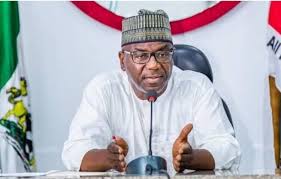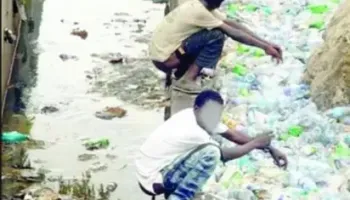Health
Insecurity: UNICEF Estimates 1m Children Afraid to Return to School

The United Nations Children’s Fund (UNICEF) says school attacks and student abduction in parts of Nigeria have instilled fear among communities stopping at least one million children from returning to school.
In a statement issued on Wednesday in Abuja, UNICEF said there have been 20 attacks on schools this year, leading to the abduction of 1,436 children, 16 deaths and more than 200 children missing.
“As more than 37 million Nigerian children start the new school year this month, at least one million are being left behind; afraid to return to school due to insecurity.
“Learners are being cut off from their education and other vital benefits schools provide, as families and communities remain fearful of sending children back to their classrooms.
“This is due to the spate of school attacks and student abductions in Nigeria over the last several months and the current climate of insecurity.
“So far this year, there have been 20 attacks on schools in Nigeria, with 1,436 children abducted and 16 children dead. More than 200 children are still missing,” the statement read in part.
It quoted Peter Hawkins, the UNICEF Representative in Nigeria, calling for an end to insecurity as it increases the risk of children never stepping into a classroom.
Hawkins also called on the Federal Government to make its priority of providing a safe space for children to benefit from education clear by addressing insecurity.
“For the most vulnerable children, including children affected by conflict, girl children, and children with disabilities, their risk of never stepping into a classroom in their lifetime is skyrocketing.
“We need to end this insecurity and make our priorities clear, that Nigerian children can and must be allowed to benefit from an education in a safe space.
“A child’s first day of school should be an exciting event for parents and children, a landmark moment in their young lives, signaling new learning and new friends that will impact their futures.
“This moment is being stolen from around a million Nigerian children this year, as insecurity threatens their safety and education,” Hawkins said.
The UN official said that it was unacceptable for communities to be worried to send their children to school for fear of being abducted from an environment that should be a safe space for them.
He also called for an end to the spate of insecurity to enable children to return to their normal lives and benefit from being at school.
Hawkins said that UNICEF and partners around the world were set to join a global ‘digital freeze’ on Sept. 16, to protest children’s inability to access the classroom due to COVID-19 restrictions.
He said that as part of the protest, social media platforms would be frozen to draw attention to the number of children at risk of missing out on an education.
“UNICEF estimates that a return to school has been delayed for an estimated 140 million children globally due to COVID-19.
“For an estimated eight million of these students, the wait for their first day of in-person learning has been over a year and counting, as they live in places where schools have been closed throughout the pandemic.
“In Nigeria, education was delayed for many children due to COVID-19 restrictions in 2020, along with the additional challenge of school closures due to prevailing insecurity across the country.
“The first day of school is a landmark moment in a child’s life, setting them off on a life-changing path of personal learning and growth,” Hawkins said.
He said that while countries worldwide, including Nigeria, are taking some actions to provide remote learning, many students are not being reached.
Hawkins listed the contributing factors to lack of reachability to include poor access to technology, poor learning environment, pressure to do household chores or being forced to work.
The country representative said studies show that positive school experiences are a predictor of children’s future social, emotional and educational outcomes.
He said that children who fall behind in learning during the early years are, therefore, likely to stay behind for the remaining time they spend in school adding that this gap widens over the years.
“The number of years of education a child receives also directly affects their future earnings. Every hour a child spends in the classroom is precious.
“It is an opportunity to expand their horizons, maximise their potential and build their country’s future.
“With each passing moment, countless amounts of opportunity are lost. We must put our children’s future first.
“We can and must tackle insecurity, stop attacks on education, and keep schools open. The clock is ticking for our young students.” Hawkins said.
He said that unless mitigation measures are implemented, the World Bank estimates a loss of $10 trillion US dollars in earnings over time for the present generation of students globally.
Hawkins said that based on evidence, the cost of addressing learning gaps is lower and more effective when tackled early and investments in education, support economic recovery, growth, and prosperity.
UNICEF urged governments to reopen schools for in-person learning as soon as possible and provide a comprehensive recovery response for students.
Together with the World Bank and UNESCO, UNICEF called on governments to focus on three key priorities for recovery in schools.
These priorities include targeted programmes aimed at bringing all children and youth back to school, effective remedial learning, and support for teachers. (NAN)
Health
Kwara Govt. Urges residents to Prioritize Oral Hygiene

The Kwara State Government has urged residents to prioritize oral hygiene by maintaining the health of the teeth, gums, and other tissues in the mouth.
Dr Amina El-Imam, the Kwara State Commissioner for Health, made the call on Wednesday in Ilorin during the opening ceremony of a three-day free oral health outreach.
The outreach was organized by the state government in partnership with Pharma Deko PLC.
Represented by the Director of Public Health, Dr Oluwatosin Fakayode, the commissioner described oral health as a vital but often overlooked aspect of overall healthcare.
She reaffirmed the government’s commitment to improving oral health across the state, stressing that it was a key component of general wellbeing.
“Oral health is the cornerstone of overall health, yet it is often neglected.
“Poor oral hygiene contributes to several non-communicable diseases, though its effects are gradual and often unnoticed until they become serious,” she said.
El-Imam commended the recent renovation and equipping of the state’s dental clinic and encouraged residents to take full advantage of the outreach by accessing free dental checks and receiving professional guidance on oral hygiene.
Also speaking, the Managing Director of Pharma Deko PLC, Mr Ishola Olukayode, expressed the company’s commitment to supporting oral health in Nigeria.
He warned that many people unknowingly use harmful substances on their teeth due to a lack of awareness, putting their health at risk.
Olukayode stressed that oral hygiene extended beyond brushing, highlighting the importance of regular professional check-ups and community education.
Delivering a lecture at the event, Deputy Director of Public Health, Dr Kasali Ajao, noted that brushing alone addressed only about 40 per cent of oral hygiene needs.
He recommended professional procedures such as scaling and polishing at least twice a year for comprehensive oral care.(NAN)
Health
Nigeria Requires N2.2trn to Eliminate Cervical Cancer by 2030 – Prof. Adewole

Prof. Isaac Adewole, Chairman of the National Task Force on Cervical Cancer Elimination (NTF-CCE), says Nigeria will require N2.2 trillion to implement comprehensive cervical cancer interventions between 2026 and 2030.
Adewole, a former Minister of Health, made this known on Tuesday in Abuja during the launch of the Partnership to Eliminate Cervical Cancer in Nigeria (PECCiN), an initiative of the NTF-CCE.
The initiative, launched at the State House by the First Lady, Sen.
Oluremi Tinubu, aims to accelerate Nigeria’s achievement of the World Health Organisation’s (WHO) 90-70-90 targets for cervical cancer elimination.reports that PECCiN seeks to catalyze multi-sectoral efforts to prevent, screen, and treat cervical cancer through sustained coordination, resource mobilization, and scale-up of service delivery.
According to Adewole, the interventions are grouped into three categories: primary prevention, secondary prevention, and tertiary treatment.
He explained that the Human Papilloma Virus (HPV) vaccination programme will be delivered through fixed sessions at health facilities and outreach-based immunisation campaigns.
“The total direct implementation cost over the five years is estimated at N387.52 billion,” he said.
“Including administrative and supervisory costs, the total cost of HPV vaccination will amount to N426.28 billion.”
He said cervical cancer screening over the same period is estimated to cost N351 billion, targeting 14.4 million women.
On tertiary treatment, Adewole noted that nearly 300,000 women will require care for invasive cervical cancer between 2026 and 2030.
“The country is projected to spend approximately N1.42 trillion on treatment, with the cost per patient dropping from N8.7 million in 2026 to N4.1 million by 2030,” he added.
In spite of other competing priorities, he urged investment in cervical cancer elimination due to its high return on investment.
“We seek your commitment and support to implement robust cervical cancer elimination interventions in Nigeria.
“This will ensure that every woman is financially protected throughout her life and no eligible adolescent is left behind in HPV vaccination.”
Dr Muyi Aina, Executive Director of the National Primary Health Care Development Agency (NPHCDA), said the Federal Government launched the HPV vaccine campaign on Oct. 24, 2023, targeting girls aged 9 to 14.
He announced that 14 million girls had already received the vaccine.
“This milestone is unprecedented globally and was achieved through strong leadership from President Bola Tinubu, the support of the First Lady, and collaboration across ministries and communities.
“The media also played a key role in spreading awareness and engaging civil society.”
Aina reaffirmed the agency’s commitment to sustaining the programme, stating that the HPV vaccine has been incorporated into the routine immunisation schedule and that primary healthcare centres are being revitalised to support service delivery.
Prof. Usman Aliyu, Director-General of the National Institute for Cancer Research and Treatment (NICRAT), described cervical cancer as a serious burden affecting mothers, sisters, caregivers, and peers across communities.
He said the growing burden prompted the development of the National Strategic Plan for the Prevention and Control of Cervical Cancer (2023–2037).
“This plan, reflecting best practices and local realities, serves as our national roadmap for cervical cancer elimination,” he said.
Aliyu added that NICRAT has constituted a national taskforce comprising experts and stakeholders to drive implementation.
He also highlighted efforts to promote innovative research, harmonise treatment protocols, and expand culturally sensitive awareness and screening campaigns.
The event featured the presentation of the National Cervical Cancer Elimination Plan and the unveiling of the PECCiN partnership logo. (NAN)
Health
Otu’s Wife Champions Healthcare Access for 500 Elderly Citizens

The Wife of the Cross River Governor, Mrs Eyoanwan Otu, has sponsored the enrollment of 500 senior citizens, aged 70 and above, into the Cross River Health Insurance Scheme.
The gesture, which covers the premiums of the elderly citizens for two years, targeted the vulnerable senior citizens in the 18 Local Government Areas of the state.
The Director General of the agency, Mr Godwin Iyala, described the initiative as “a significant milestone in the first lady’s humanitarian outreach”.
According to Iyala, the first lady had already made full financial commitment to cover the 500 beneficiaries for the next two years.
“This initiative prioritises our elderly population, many of whom had spent decades serving their families and communities.
“Her Excellency has once again demonstrated her deep sense of empathy and leadership.
“The ripple effect of this act is far-reaching because when the aged are cared for, families are relieved, and the moral fabric of our society is strengthened,” he said.
He commended Otu for the initiative, describing it as a lifeline for elderly citizens, particularly those in the rural areas, who face significant barriers in accessing healthcare.
Iyala stated that the Agency would begin immediate enrollment of the beneficiaries into the health insurance database, to ensure they begin to enjoy prompt and uninterrupted access to medical services.
He further said that the initiative was expected to significantly ease the burden of healthcare cost to elderly citizens, offering them a renewed sense of dignity and security in their twilight years. (NAN)






























